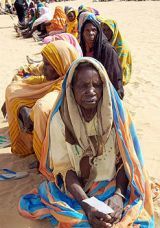Darfur talks manage first plenary session, despite splits
ABUJA, June 12 (AFP) — African Union mediators pushing for a solution to Sudan’s Darfur crisis managed Sunday to gather parties in a first plenary session at peace talks here, despite continuing splits, a spokesman said.

|
|
Darfurian women wait for food supplies in the Abu Shouk. (AFP). |
The meeting, after a similar attempt failed Saturday, was decided at the last minute, said Boubou Niang, a Senegalese spokesman for the AU mediators.
“The session was attended by all the parties, facilitators, partners and observers” in the bid to end two years of civil war in the western Sudanese region, he said.
The fighting between rebels and government forces backed by Arab Militias has kept up despite a ceasefire last year.
International pressure has intensified to end bloodshed that has already claimed hundreds of thousands of lives and led to one of the world’s worst humanitarian crises.
Sunday’s session was the first face-to-face encounter by parties at this 5th round of Darfur talks, which resumed in the Nigerian capital Friday after a six-month suspension. The last round foundered in December as each side traded accusations of truce violations.
There were few immediate details about Sunday’s face-to-face, which the spokesman said lasted 40 minutes and followed separate, closed-door discussion earlier in the day.
Chief AU mediator, former Tanzanian foreign minister Salim Ahmed Salim, “outlined the agenda, methods of work, the code of conduct to be abided by all parties,” said Niang.
Participants said he had urged all sides not to say too much to the press to avoid fanning differences and jeopardizing the talks, hampered by bitter splits over which neighboring countries should participate.
One of the rebel groups opposes any part by Chad, accusing it of siding with Khartoum, while the Sudanese government opposes Eritrea, accusing it of backing rebels.
“Dr. Salim stated that the declaration of principle (adopted in December) will be the first item on the agenda … before taking thematic issues such as, among others, power sharing, wealth sharing, and security arrrangements,” the spokesman said, adding the parties had adjourned and would resume work Monday.
No deadlines have been set, but the AU wants this to be the final round and to reach a solid political agreement.
Special UN representative for Sudan, Jan Pronk, said mediators hope for a solution by July 9, when the Sudanese constitution is due to be reformed.
On Saturday, both he and Ahmed Salim cautiously suggested the atmosphere was more favorable than before.
“There are reasons to be satisfied because when we touch on essential questions, the parties are going in the same direction,” the AU mediator had said.
But a statement by the Sudan government repeated that Eritrea’s paticipation an “unwelcome interference” and “a smoke-screen”, to thwart any comprehensive peace in Sudan.
The war has claimed between 180,000 and 300,000 lives, displaced 2.4 million people and sent another 200,000 fleeing to Chad.
Violence broke out in Darfur in February 2003 when a rebel uprising against the government led Khartoum to unleash Arab militias known as Janjaweed on a scorched-earth campaign.
The Janjaweed in particular are accused of “ethnic cleansing”, torture, rape and intimidation.
Humanitarian officials say Darfur is growing more desperate, with not enough funding to meet chaos triggered by drought, famine and the long-term effects of conflict.
